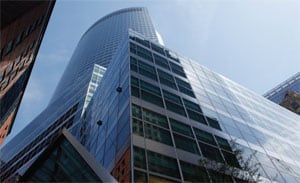United States
By Gordon Platt
 |
|
Goldman Sachs: Fraud allegations hit its reputation |
The Securities and Exchange Commission charged Goldman Sachs with fraud on April 16, causing a sharp decline in equity prices, particularly for financial shares, and especially for Goldman’s own stock, which tumbled more than 15% before recovering slightly in a day of frantic trading. US securities regulators charged the Wall Street firm with defrauding investors by not telling them about conflicts of interest in subprime mortgage investments it sold as synthetic collateralized debt obligations, or CDOs.
CDOs and credit default swaps were at the center of the financial maelstrom that nearly toppled the global financial system. In a civil suit, the SEC alleged that Goldman did not tell investors that Paulson & Co., a hedge fund, was involved in choosing the subprime mortgages that were bundled and sold to investors in a CDO known as Abacus 2007-AC1. The complaint says Paulson picked mortgages that were likely to default and later took a short position against the CDO, which fell in value and cost investors more than $1 billion. Paulson paid Goldman $15 million to structure and market the CDO, according to the SEC.
Fabrice Tourre, a 31-year-old Goldman vice president who the SEC said was mainly responsible for creating Abacus, was also charged with fraud. The SEC cited an email that Tourre sent to a friend saying, “More and more leverage in the system, the whole building is about to collapse anytime now… Only potential survivor, the fabulous Fab[rice]…standing in the middle of all these complex, highly leveraged, exotic trades he created without necessarily understanding the implications of all these monstruosities!!!” (sic). Goldman says the SEC’s charges are completely unfounded.
The case was the first to be brought by the SEC’s Structured & New Products unit of the Division of Enforcement. More such cases are likely as the agency narrows in on complex financial products that brought down the house of cards.



